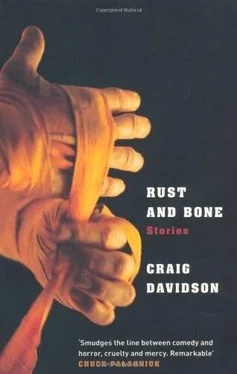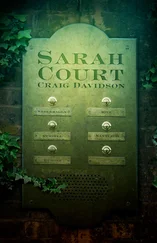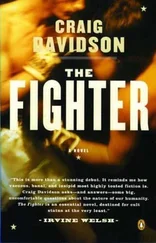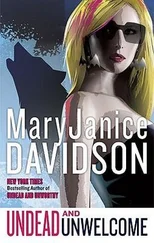“Is that so?”
“It’s been … a regular boot camp.”
Dr. Ketchum chuckles perfunctorily. “Alright. The problem remains, James. Your scrotal sac is simply too hot . A blast furnace in there.”
This is not new information. Five years ago, when our fledgling, lighthearted attempts at conception ended in failure, we blamed our lack of success on job stress, our recent relocation, a sheer lack of dedication to the task at hand. But as the streak lengthened, the finger of blame began to point wildly: the moon’s cycles/Alison’s low-protein diet/my pack-a-day habit/malevolent otherworldly forces. Alison visited a fertility clinic and, through a non-invasive, airy-fairy, casting-of-bones procedure I never truly understood, her womb was given a clean bill of health. Confusion and guilt propelled me to Dr. Ketchum’s office, where a violently invasive, teeth-clenchingly painful process disclosed that my scrotum’s core temperature equaled that of a steam cooker’s. The few vulcanized sperm able to withstand the heat were reduced to heaving their exhausted flagellate forms against my wife’s egg in the manner of bedraggled boat-people flinging themselves upon the impregnable walls of an asylum-denying nation.
Ketchum prescribed pills and herbal remedies, ordered the daubing of foul-smelling ointments and the quaffing of putrid teas. He suggested immersion in cold baths or icepack application to the affected region before intercourse. None of these measures proving effective, Ketchum advocated a strenuous exercise routine and … other tactics.
“Have you encouraged your wife to stimulate you anally? Gentle manipulation of the sphincter encourages more vigorous orgasms and promotes semen—”
“No, we … no.”
Ketchum emits a robust, let’s-not-be-prudish laugh. “Then by all means try . It’s a natural, healthy sexual activity. Nothing peculiar or unmanly about it.”
A fleeting image: Ketchum’s naked, pinata-hollow body squirming delightedly under the anal ministrations of a faceless, tentacle-fingered woman.
“It’s not that desperate.”
“But your wife must be getting impatient.”
“Alison’s fine,” I lie.
Sex has become a grim struggle punctuated by bizarre and superstitious rituals. While I lounge in bed with a bag of frozen peas thawing in my boxers, Alison discreetly checks her internal temperature against the magical twenty-seven degrees Centigrade ideal for conception. She has dressed as a French maid, a succubus, a cheerleader— Ra-ra, hey-hey, fertilize that egg to-day! —a schoolgirl, a milkmaid; the local costume shop conducts a brisk trade on my singular shortcoming. No sooner have I made my contribution than she’s shoved me away, elevating her hips and bicycle-kicking her legs, body contorted into grotesque runic formations to aid my seed in “taking.” Worst is the look on Alison’s face as I come: a look of disquieting, anxious futility. Not this time, tiger. You didn’t bring the thunder .
“Alison’s just fine,” I repeat. “We have other interests.”
“Wonderful. It’s important for couples with such issues to pursue outside goals.” He flips the dossier shut. “Keep those exercises up—” a few more demonstrative deep-knee bends “—and don’t forget the urethra-widening—” his eyes trail down to my calf “—good lord, James, what happened to your leg?”
ALISON’S FATHER OWNS a dairy farm on the outskirts of St. Catharines. When he spies a sick cow, he spraypaints an orange circle around the rear left leg. At night, when all the other chores are finished, he leads it to a brook running behind the house and shoots it in the skull. Once, when Alison and I were visiting at Christmas, he asked her to take care of a sick calf; it was cold and her father’s arthritis was acting up. Alison asked did he keep his gun in the same spot.
Bundled in parkas and toques, we went out to the barn. Can’t say why I tagged along, exactly, except perhaps morbid curiosity, or out of the misplaced notion she needed the moral support. The barn was dark and earthy, claustrophobic with the stink of livestock. Cattle snorted and heaved, expelling plumes of oyster-gray steam from their nostrils. We waded between their milling flanks, guided by bars of dusky sunlight pouring through the slats. A sponge-like tumor the rough size of a softball was tethered to the calf’s jaw by a strip of skin. Alison shooed the youngster from its hiding spot beneath its mother’s belly. The cow let it go without a fight, as if knowing it was sick, what needed to be done.
She led it down to the water, guiding it gently with a switch snapped off an elm tree. The calf’s eyes wide and dark and dumb. The grotesque tumor bump-bumped against its throat. Early twilight hung suspended over the fields, patches of orange burning between the trees. Sparrows clustered on a snow-topped log lying in the middle of the brook.
Alison settled the shotgun against the calf’s head. It flicked its ear, as though the muzzle were a fly it wished to shoo. I remember wind whistling down my neck and feeling terribly cold.
Alison cocked the hammer and calmly pulled the trigger. The gunshot louder than I expected, a rough bark rolling out across the clean snow-topped expanse. The animal went down silently. It half-stood on its front legs. The left side of its face was just … gone . I wanted to yell “Go down, just go down, ” the way a trainer would to an overmatched boxer. It fell over on its side in the shallows. We went back inside for hot toddies.
Half an hour after my doctor’s appointment, I step through the front door of our house. From the upstairs nursery arises the plaintive clamor of pit bull puppies seeking attention—attention I studiously deny. Pass down a hallway hung with photos of champion pits chained to spikes pounded into browned patches of grass, mouths open and teeth bared, straining against their fetters.
Alison stands over the kitchen sink shaking water from a colander of diced zucchini. The cordless telephone is cinched between her shoulder and ear.
“No, no,” she’s saying, her tone that of a mother explaining a crucial fact to a particularly dimwitted child, “that is not the progression. Bulldog to German shepherd to Doberman pinscher to Rottweiler to pit bull. It goes no further . There is no evolution.”
I place my hands on her hips and bring them around, fingers knitting over her bellybutton.
“No, I don’t … no … that’s in- sane .” She twists out of my grasp, pressing the mouthpiece directly to her lips, as if this forced intimacy will convey the truth of her argument. “The presa canario is nothing more than a puffed-up bully. I mean, will a hundred-twenty-pound presa beat a pit? In all probability, yes. But a heavyweight boxer would pummel a flyweight—it’s no contest. That’s why there’s weight classes … no … alright, yes … listen, I’m not going to argue.” Alison hangs her tongue out. “Fine, if that’s how you see it. All I’ll say is, pound for pound, nothing beats a pit. Pound for pound, yes … okay … fine … we agree to disagree.”
She jams the phone in its charging cradle and blows a raspberry at it.
“Who?”
“Nobody. Nothing. How was work?”
“Fawkes deep-sixed the Supp-Easy-Quit account.”
“It’s a tough product to market.”
Alison always lets Fawkes off the hook. I took her to the office Christmas party last year and discovered the two of them in the copy room, sloppy drunk and giggling, photocopying asexual body parts: elbows, fingers, wrists, foreheads.
“And your day?”
“Oh, Dr. Scalise was being Dr. Scalise.” Dr. Phillip Scalise, the cardiovascular surgeon at North York General, is thirty-five with the coarse-skinned face and dimpled chin of a Look Who’s Talking –era John Travolta. Alison is his “all-time favorite” OR nurse. “During prep he was telling these awful jokes, just plain awful, and I shouldn’t have been laughing but he’s really just so silly sometimes.”
Читать дальше












